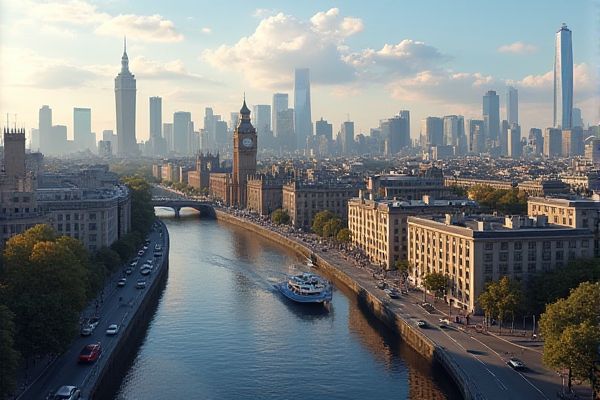
Cultural and recreational activities in United Kingdom: Diverse art galleries and museums. Traditional British theatre and performances. Vibrant music festivals across regions. Iconic landmarks and historical sites. Abundant parks and nature reserves. Extensive hiking trails and walking routes. Unique regional food festivals. Popular sports events and tournaments. Thriving local markets and fairs. Rich literary history and celebrations.
Diverse art galleries and museums.
London is home to a vibrant and diverse art scene, featuring numerous world-class galleries and museums such as the Tate Modern, Tate Britain, Whitechapel Gallery, and the British Museum. Alongside these, smaller, innovative spaces like Hauser & Wirth, Gagosian, and the Serpentine Galleries offer a wide range of contemporary, modern, and historical art exhibitions.
Traditional British theatre and performances.
Traditional British theatre has a rich history dating back to the Roman occupation and medieval periods, with forms such as mummers' plays, mystery plays, and pageant cycles. The tradition evolved through the Renaissance, Restoration, and subsequent centuries, influenced by notable figures like Shakespeare, and continues to thrive in contemporary forms, including West End productions and the work of institutions like the Royal Shakespeare Company and the National Theatre.
Vibrant music festivals across regions.
The UK is home to a diverse array of vibrant music festivals across various regions, including the Aldeburgh Festival in East England, BBC Proms and London Jazz Festival in London, Bluedot Festival in the North West, and Glastonbury and End of the Road Festival in the South West, each offering a unique blend of classical, folk, jazz, rock, and alternative music. These festivals contribute significantly to the UK's economy and cultural landscape, attracting millions of attendees and showcasing both established and emerging artists. To explore more about these dynamic events, visit the British Council Music Festivals page for detailed information.
Iconic landmarks and historical sites.
Explore the majestic sweep of British history through its iconic landmarks like Stonehenge, Hadrian's Wall, the Tower of London, and Lindisfarne Priory, each offering a fascinating glimpse into different eras, from prehistoric times to the Norman Conquest and beyond. These sites serve as tangible chapters of the ever-evolving narrative, with places such as the Roman Baths illuminating ancient Roman life or Ironbridge Gorge capturing the industrial revolution's spirit. Additionally, Edinburgh Castle stands as a proud symbol of medieval history. For those intrigued by the detailed chronicles and interactive explorations of such sites, Evanevanstours offers a thorough timeline, showcasing the development of these landmarks like the evolution of Stonehenge. Experience England's diverse historic offerings, from royal castles and historic gardens to renowned prehistoric sites, courtesy of organizations including English Heritage, Historic Houses, and the National Trust, reaffirming the timeless allure of British heritage.
Abundant parks and nature reserves.
The UK boasts 15 National Parks, encompassing 10 in England, three in Wales, and two in Scotland. These parks are safeguarded by law to preserve and enhance natural beauty, wildlife, and cultural heritage while promoting public enjoyment and understanding. Moreover, there are 221 National Nature Reserves in England, managed by Natural England and other organizations, which provide public access for walking, research, and educational activities. To learn more about these national treasures, visit the official UK National Parks website for comprehensive information.
Extensive hiking trails and walking routes.
The UK offers extensive hiking trails and walking routes, including 16 National Trails in England and Wales, such as the Pennine Way, South West Coast Path, and Hadrian's Wall Path, which provide diverse landscapes, historical sites, and varied challenges for walkers, cyclists, and horse riders. These trails reveal the rich history and natural beauty of the region, attracting outdoor enthusiasts from around the world. Discover more about these remarkable paths and plan your next adventurous journey by visiting the National Trails website.
Unique regional food festivals.
The UK hosts a diverse array of unique regional food festivals in 2024, including the Great British Food Festival with events across England, Scotland, and Wales, the Rock Oyster Festival in Cornwall, the Ludlow Food Festival in Shropshire, and the Abergavenny Food Festival in Monmouthshire, each showcasing local producers, artisan foods, and live entertainment. These festivals offer a rich culinary experience, highlighting the distinct flavors and traditions of different UK regions. For more details on these events, you can visit the Best Food & Drink Festivals website.
Popular sports events and tournaments.
The United Kingdom is home to a rich array of popular sports events and tournaments, including the Wimbledon Championships in tennis, the Open Championship in golf, the Royal Ascot and the Derby in horse racing, and prominent football, rugby, and cricket matches, such as the Premier League, the Six Nations Championship, and international cricket tests. These events attract significant global attention and are integral to British sporting culture.
Thriving local markets and fairs.
The UK is home to a vibrant array of local markets and fairs, such as the Weald of Kent Country Craft Show, Makers Central, and Handmade in Britain, which showcase British craftsmanship, offer live demonstrations, and provide opportunities for artisans to connect with consumers and industry professionals. These events feature a wide range of products, including outdoor items, fashion, art, and handmade creations, catering to both local and international audiences. For a comprehensive guide to some of these spectacular events, you can explore The 10 Best Craft Fairs in the UK for more details and insights.
Rich literary history and celebrations.
The United Kingdom boasts a rich literary history, with England's literature being its most influential cultural expression, spanning from Anglo-Saxon works to the Elizabethan era, the Romantic Period, and modern authors. This literary tradition is celebrated through numerous literary festivals like the Hay Festival and Marlborough Literature Festival, which honor this heritage through readings, workshops, and tributes to esteemed writers. For more insights into England's profound impact on cultural arts and literature, the section dedicated to The Arts on Britannica provides an extensive exploration of these remarkable contributions.
